I am trying to get one more blog entry in this year about my last field visit before we do a more extensive holiday blog. I had mentioned in the last entry that I had gone to Woldiya, a city in Northern Amhara to see the work of one of our partners called EMWACDC. It is the development wing of the Mulu Wongel church and has been working in this area on providing food security and watershed rehabilitation for many years.
 |
| Women self-help group leader |
From the air, the unique contour of the land is very apparent. First, if you look off to the right you can see clearly an escarpment that goes into the rift valley--the arid region of Afar. But the mountainous area directly below looks more like it was carved out by dwarves of Middle Earth. All the 'mountains' are flat on top and the same height, but they are completely furrowed with canyons and ravines. It looks like an enormous glacier may have sat on this land and carved out the contours. These aren't mountains that pushed up, but valleys and giant ravines carved by ice and water onto a flat plateau. Landing in Kombolcha is like diving into one of the larger basins. It seems people live in the crevices, not on the tops.
I was traveling with Mesfin, our food security program manager on this trip. We met our driver at the airport and he took us to Woldiya with a short stop in the town of Dessie for some breakfast. Dessie is a large bustling town, as is Kombolcha. I was remembering a year ago as we heard news reports of the TPLF overrunning and occupying these towns just a year ago shortly before we evacuated. There is still some evidence of destruction and a lot of construction on some buildings that had been destroyed. It seemed hard to believe that a town this big was occupied by an invading army.Once in Woldiya, another descent-sized town with large mosques as well as Orthodox churches in evidence, we checked into our hotel where we met Gesesse, the project manager for EMWACDC. He was quick to tell us that the hotel, the best one in the town, had been headquarters for the TPLF top brass when they invaded. He also pointed to nearby mountain overlooks where they had brought munitions and shelled the town. Gesesse, like most everyone we were to meet, seemed to want to tell his story about the TPLF invasion--a way of processing the trauma I think. Five armed soldiers came to Gesesse's home where he was staying with his wife and two children. The soldiers took every scrap of food and all the grain they had for making injera and bread. The soldiers then marched Gesesse over to his vehicle and tried to force him to give them the key. Gesesse said it was not his car, it belonged to an NGO and he did not have the key. The TPLF had many technical specialists who quickly hot-wired it and took it anyway. Gesesse and his family spent months without electricity or running water, and had to scrounge some hidden food reserves to eat. It sounded really scary. The hotel also showed signs of wear. There was no regular electricity or water while we were there. They ran a generator after 6pm for light and had water on for about 2 hours a day. All the rooms had been looted and there were no TV sets or other electronics (or working hot water) in them.Nonetheless, the food was still good (authentic Amhara food). After settling in, we had a meeting at the EMWACDC project office, then returned to the hotel and slept comfortably. The next morning we went out to see some of the work they had done in the past.
EMWACDC had spent the past 6 years working with communities on gulley rehabilitation as part of their watershed rehabilitation strategy. This is very appropriate considering the terrain, as most of the farmers live in the valleys between the steeply rising mountains. Gulleys form quickly when land is not well managed; when the rainy season comes and can swallow whole fields in a single season.We walked up several gulleys full of trees and multiple check dams that had been stabilized. Some had even become markedly shallower as soil was reacaptured by check dams. We talked to multiple farmers living along the gullies who are trained in how to maintain the waterway to keep it from cutting too far left or right and beginning erosion again. All the farmers expressed gratitude for the work EMWACDC had done, and it was clear that the work of community education and motivation had gone hand in hand with alot of manual labor.
There were some areas of the larger gullies that needed repair, and it was an opportunity to see how quickly farmland can be lost when the soil is not stabilized.Along with gulley rehabilitation, we had the chance to see the work they had been doing in promoting conservation agriculture adoption. CA is a low tillage farming technique that includes mulching, spacing, intercropping, green manure cover crops, and other strategies to improve soil and increase yield. I was actually surprised at the level of success they had had in promoting adoption, as it is very different than the preferred method of cultivation. An Amharic proverb talks about a bare well-plowed field is a sign of dilligence while a grown-over field, the sign of laziness.
The theory of change they are using is called Diffusion of Innovation and is based on identifying and training comunity innovators and early adopters who will start to use the technique, then influence their friends and neighbors to do the same.We interviewed several farmers including a very charismatic old woman who practiced CA and had convinced all of their adjacent neighbors to do the same. The difference between a CA and non CA corn stand was really clear to see. I could see why others might want to adapt as well.
Like Gesesse, everyone we talked to had a story of the TPLF invasion. Even in the rural areas, soldiers had come and looted all of their stored grain and left them with nothing. They described, often in tears, a very difficult 6 months. They were also quite grateful for an emergency intervention that EMWACDC had done in the past year to help them recover. With support of MCC, EMWACDC had supplied them with 6 months of food relief as well as some livestock to help them restock their herds. The next morning we were out again in the field. We began by visiting a woman's self-help group. we sat in on the meeting and listened to the women tell us their successes and challenges in saving together so they could do small income-generating projects. Despite setbacks and inability to meet during the occupation, they had started up again and had saved about $1000 between them to date. The self-help group also served as a support group to process trauma.We ended our field visit by meeting some local govt officials in a new Kabele where they hope to be working. The local officials and community elders were very hopeful about having training in CA and some watershed management assistance.
On the way back to the hotel, we had a debrief at the EMWACDC office then took a trip toward Tigray and visited the nursery that had been part of the past project phase. It had been destroyed by the TPLF and sadly, one of the nursery guards was shot and killed when the TPLF arrived.It seemed like a very full week for a 2-day visit, and Mesfin and I returned, encouraged by the work they were doing.
While I was gone, other things were happening for other family members. Rebecca picks up from here:
Life in Ethiopia is always unpredictable—no wait, make that life in East Africa. Or, to be more accurate, you have to be very, very on-top-of-things to foresee the ways that things are going to go wrong.
We have long planned some rest time out of the country after Christmas. First we hope to join old friends from Tanzania days and Burundi days at a missionary retreat conference outside of Nairobi. Then we plan to take a shuttle bus down from Nairobi to Arusha and spend the rest of New years’ week in our old stomping grounds. It was a fairly straightforward plan, right? We even got airtickets one way for the same price as a round trip. Until I went online to apply for our visas ahead of time…
As I was applying for David’s Tanzania visa, I realized that David’s passport will expire in mid-May. A long time from now. And yet Tanzania requires a passport to be valid for at least 6 months from the date of entry to issue a visa. So David’s passport is already de facto expired. And really he needs to have 6 months validity to re-enter Ethiopia. This was a big problem because Tanzania has no embassy here dealing with visa issues. Getting an appointment at the US embassy to renew David’s passport? Well, the first available appointment was in February. But I sent a panicked email and they granted us an expedited interview. It was exactly 14 working days before our travel, and the embassy states that they return new passports in 14 days – so it was a long shot that we would even get the new passport back before we traveled. Both parents need to be present to renew a minor’s passport, unless you can get a form signed and stamped by a notary public, which is an legal entity that does not exist here in Ethiopia. There was nothing for it but for Paul to change his field visit plans, stay in town, and go together with me and David to the visa appointment. There were many other small details of what might have been a horror story—like getting the photo studio to print out David’s headshot in the correct size, going back there at 8:30 pm the night before the appointment.
 |
| last Sunday School class before Christmas |
So last week was supposed to be Activities Week for all
of middle and high school students. David’s 8th grade has a
traditional class trip to Northern parts of Ethiopia, in conjunction with their
curriculum studying history and geography of Ethiopia. We are grateful that
Northern Amhara around Bahir Dar and Gondar has been stable and it seemed OK for
them to travel there. Here is a little forced dictation ;-) from David about this trip:
I took a plane with my class to Bahir Dar and we drove to the Jacaranda hotel. The hotel was fine. Then we took a bus to go and take a hike to a waterfall, The Blue Nile Falls. On the first part of the hike, we walked through a bunch of rocks and then we arrived at the waterfall. We had to cross a narrow suspension bridge to the waterfall from the other side. Some people were scared, but it was fine. The next day we got on a boat, and we sailed for about 4 hours to get to an island with an monastery. When we got off at the island, we went inside the monastery. The walls inside depicted scenes from the bible for people who could read, to help them understand. Our tour guide was a pretty cool dude, and told us a lot of things about culture. We visited one or two other monasteries on a different island. We spent less and less time at each monastery because they were planned all the same way, just different paintings. In between monastery stops, I was reading the whole day. We were on the lake (Lake Tana) for about 7 hours that day. On the third day of the trip, we walked around the city of Bahir Dar for a long time. We saw one market, and a bunch of other stuff. In the afternoon, we drove up to the palace hill, saw the sunset and walked all the way back down. On the fourth day, we had a long bus ride to Gondar. We moved hotels and on the way we got lunch near a castle. I really enjoyed the Ethiopian food that day! We visited the castles and baths in Gondar.
At the new hotel, me, Peter and Ahmed explored the 6th floor and realized that the 6th floor was like a horror movie. It was pitch black with no light and really terrifying. So we devised a plan to bring people up there so that I could scare them. There was a tiny crack in a door and I spoke in a creepy voice. That was the most fun part of the trip. On Friday morning, we flew back to Addis and I was picked up my parents who are fine, and I was forced to write this, so that’s why it’s not that well written.
So back to the rest of Activities week… At the last minute, the government declared that this very week would be a week of exams. This was a problem for Bingham because most of the service activities involved running sports and kids’ camps for government school kids. These kids were suddenly not available to come play for the week. Furthermore, some of the sites further outside of Addis seem to be more unpredictable in terms of security. Long story short, the Bingham administration had to make a decision 4 days before activities week started to postpone it. I felt so bad for all those teachers who thought they had finished their teaching for the term, needing to come up with last minute lesson plans for one more week…
Paul and I had been planning to have a nice quiet week without the kids. But as it happened, Paul left for Woldiya on the same morning that David had to be at the airport. And Oren was home. So, Oren and I had a quiet week at home instead. We spent a couple of evenings working through special essays for a few of his college applications. We also enjoyed watching the World Cup Semi-Final games, staying up way to late to watch Morocco narrowly lose to France in a nail-biting, frenetic match. It was really lovely to see how those teams appreciated one another and gave warm congratulations at the end in a real spirit of camaraderie. Maybe that’s because France is one of the most African teams in Europe and we were all sad to see the World Cup ambitions of an African team come to an end. Oren especially was rooting for Morocco. It was really nice to have that special time with my oldest since we don't have many more months with him under our roof.
The biggest event of the past week was our Community choir concert. We had to prepare ourselves to leave early for warm ups at St. Matthew's church across town. It was a truly wonderful occasion, and I think we sang as well as we could be expected to have done. More changes though – one key person got very sick that week and couldn’t come to play piano for the Hallelujah Chorus. It was amazing that another young man had 24 hours to practice and get it up to scratch for the concert. We had some community Christmas caroling with a small band of 2 trombones, trumpet, violin, flute, piano and percussion. Other ensembles and soloists filled out the program. I really enjoyed a 5 person a cappella ensemble with amazing blend. Two of those singers also introduced an original composition on piano and violin that was quite delightful, about Jesus and the visit of the Wise Men. It was probably the height of Christmas festivities for us.
The next evening, we set aside time to watch the World Cup Final. What an amazing game, completely worth watching right up to the very end. One of the most riveting games ever played, probably. And we had many passionate discussions about it with our colleagues over tea and lunch break in the following days. It’s really nice to find these points of discussion in which everyone can participate and are not about the political or religious situation in Ethiopia.
Sadly, I began to feel unwell on Sunday, with a whole kaleidoscope of symptoms. But I was pushing through, finishing work, getting plans in place to lead the Christmas Eve service at church, as well as the Christmas morning service. I really thought I just had a bad head cold by yesterday. But this morning, when I woke up and couldn’t smell the Vicks Vapor Rub I was using for congestion, I thought I better take a COVID test. And sadly, I am positive. This changes everything about plans for this Christmas weekend. We have had to miss a family gathering today that we were really looking forward to. I don’t think it will be wise for me to be at church. This will be a very different Christmas, keeping out of the way of everyone. I pray that the rest of my family can stay healthy, and that our travel plans are not interrupted. But as I stated before, life is very unpredictable.


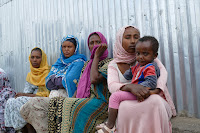


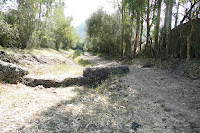



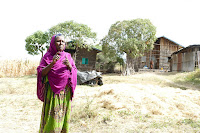






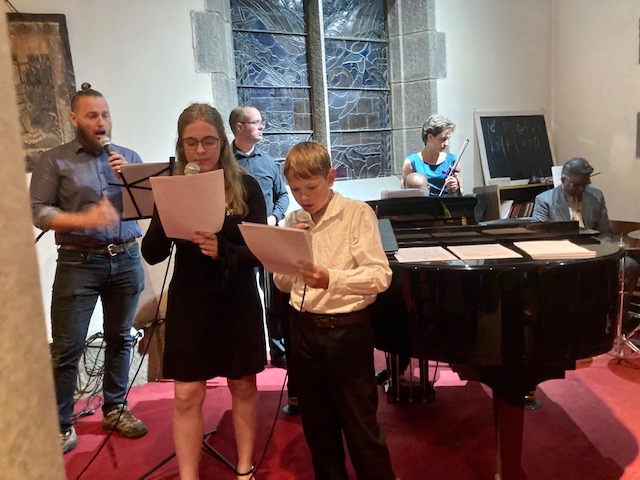

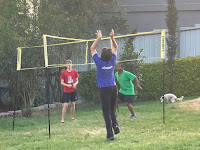

No comments:
Post a Comment